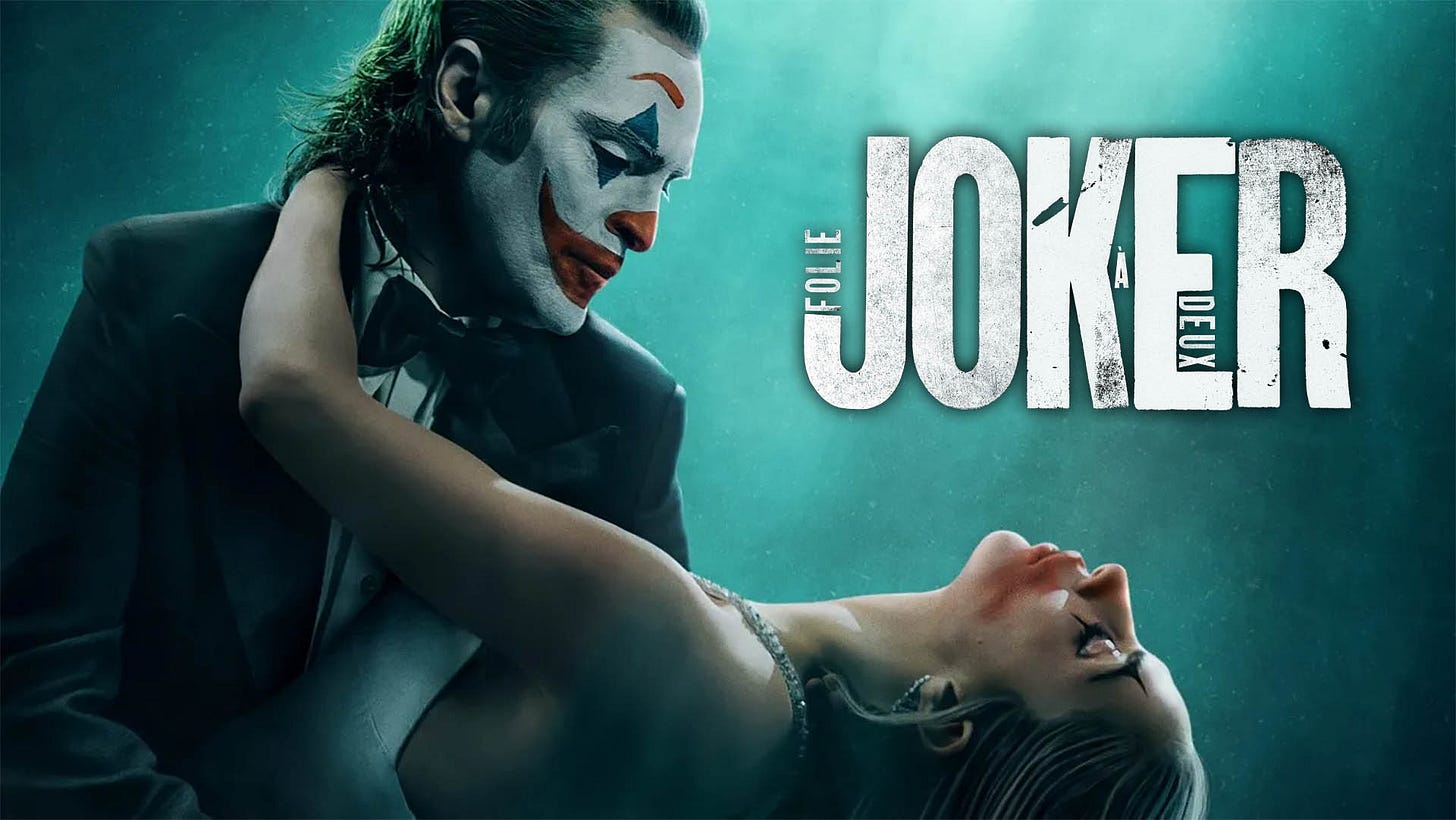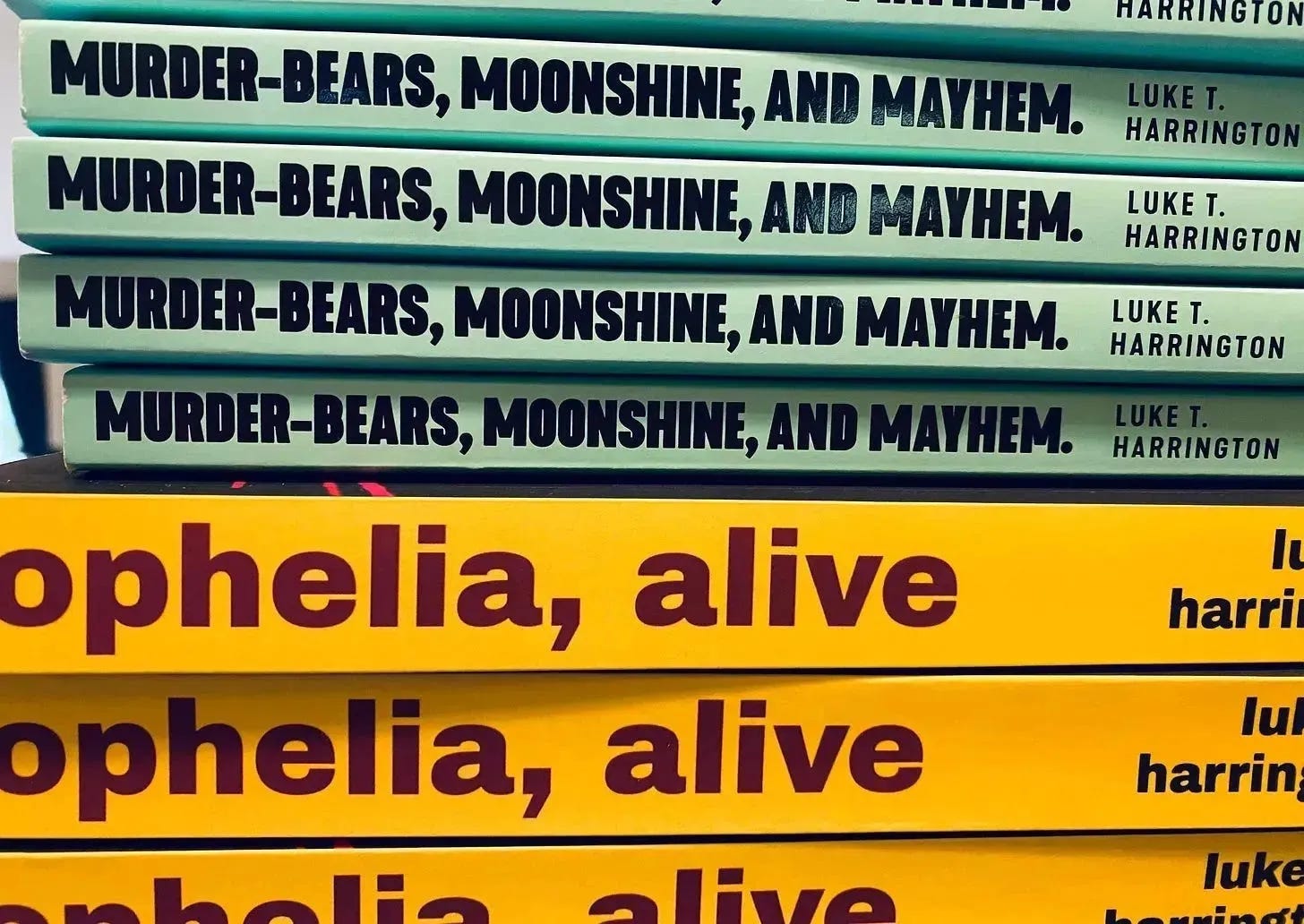So let me get this straight: I thought Joker 2 was pretty okay?
I did. And I'm tired of pretending I didn't
In the summer of 2020, when many of us were still locked inside our homes and cities around the country were in various states of on fire, I remember coming across a Facebook post from a friend who had spent the last several days arguing with various interlocutors about the political utility of rioting. He had linked to a news article about the Minneapolis City Council passing a “defund the police” resolution with commentary along the lines of “See??? Because RIOTS FUCKING WORK!!!”
I didn’t respond at the time, seeing as questioning the practical value of riots was a fireable offense on the internet that summer, but I do remember thinking that (1) I still wasn’t convinced that riots “fucking worked,” but even if I were, (2) I’d probably refrain from advertising that fact, seeing as my political opponents were just as capable of rioting as anyone. And I guess those instincts were eventually vindicated, since, by the end of the following year, Minneapolis voters had nixed the “defund the police” plan and a MAGA mob had rioted its way right into the DC Capitol.
And it’s always easy (and fun!) to congratulate yourself for having half-remembered, unvoiced thoughts, but the more I think about that post, the more struck I am by the absurdity of it. The friend in question was a professional opera director—and opera, as you may be aware, is an art form that has literally always depended on the generous patronage of the über-privileged. Despite my friend’s relentless leftist posturing, if violent revolution ever truly came, he would have found himself somewhere between “suddenly unemployed” and “lined up against the wall”—which I guess explains why he was cheering the riots on via Facebook, instead of walking out his door and setting fire to things.
In the summer of 2020, though, my friend’s post was more the norm than the exception—social media was crawling with relatively privileged white people cheering on every sort of violence, as long as that violence wasn’t a direct threat to their own privilege. (Was I part of the problem there? Possibly!) It’s an observation that’s been made so many times that it’s become banal at this point (I recommend Musa al-Ghabri’s recent book We Have Never Been Woke: The Cultural Contradictions of a New Elite if you’re looking for a fairly serious, academic treatment of the phenomenon), but becoming aware of it helped partially answer the burning question of how so many people, including poor people and even record numbers of minorities, could support a Trumpist Republican Party: when it’s a choice between the party that will do nothing for you and the party that will do nothing for you while cheering on the violence in your community…well, it’s hardly a choice at all, is it?
But it was Todd Phillips’s 2019 Joker movie that first threw that into sharp relief for me.
(Article continues after the break:)
Hey there, stranger! Welcome to my Substack. If you sign up to receive it in your email inbox, I’ll send you e-copies of both my published books for free, and enter you in a drawing to win a signed paperback copy of each. You can scroll to the bottom of this post for more info, or else just enter your email address here:
I’m aware of how that sounds—barely a step up from saying that I learned how magnets work from the Insane Clown Posse—and, to be clear, I’m not proud of this. Joker, when it was first announced, struck me as a film that had a nearly-zero chance of getting my money; I’ve been sick of comic book movies in general—and the Joker in particular—since before some of you reading this were born. The Dark™️, Gritty™️ themes of modern Batman comics (“did u kno that masked vigilantes are at best ethically ambiguous???”) have been done to death since the ’80s, and I had no desire to see them rehearsed yet again. But then the movie came out and the response to it was just…unhinged.
I ended up seeing Joker mainly out of a curiosity that had been piqued by all the pearl-clutching write-ups in the media. Reviews frequently refused to engage with the film at all, instead pontificating on how irresponsible it was of Warner to release the film at the height of the Trump years and how it would doubtless spur armies of Nazi MAGA incels to commit heinous acts of violence (which, to be clear, didn’t happen—the film was screened worldwide without incident). It was the sort of breathless moral panic I expected from evangelical Christian publications, not from mainstream journalists, who of course depended on free speech to do their jobs—but, more to the point, many of whom had terms like “leftist,” “socialist,” or “#DSA” in their Twitter bios (and who would go on to cheer for the violence of 2020).
This was especially striking, since—for my money—Joker, while not a particularly great movie, was an unambiguously leftist movie. It was a story of the Forgotten Man—a man burdened by poverty and mental illness, who, having been abandoned by the economy, the state, and everyone else, semi-inadvertently launches a violent uprising. It wasn’t a movie I loved, but it was a movie that substantially colored my thinking, which might actually be higher praise.
When they announced a sequel, then, my attendance was a foregone conclusion—especially when they said it would be a musical. I’m guessing the overlap between “Joker fans” and “musical fans” is roughly one person (i.e., me), but I am here for anything that experiments with the weird, the campy, the eclectic, or the grotesque, and it looked like Joker: Folie á Deux would be dipping into all of those.
The abysmal reviews and audience scores (a “D” from CinemaScore! I always assumed CinemaScore gave you an automatic “B+” just for showing up!) were enough to put a damper on my enthusiasm, but not to keep me away forever. And now I’ve finally gotten around to seeing Folie á Deux, and I can happily report that…it’s fine.
Folie á Deux is not a great movie, but I don’t think it’s necessarily any worse than Joker. Most of what Joker got right, Folie á Deux gets right: Its greasy, sweaty cinematography nails the feel of a classic Scorsese picture. Joaquin Phoenix’s title character, Arthur Fleck, manages to be pathetic, menacing, and compelling all at once. The film’s nihilism and cruelty never let up. And the new additions—the musical numbers and Lady Gaga as Harley Quinn—add far more to the proceedings than they detract from them.
Folie á Deux’s chief failing—the one that both audiences and critics have found themselves unable to forgive—is its refusal to actually go anywhere. The film denies audiences the crime thriller they were expecting, instead confining itself mainly to a courtroom where the events of the first film are relitigated. Phoenix’s character doesn’t develop much, either, vacillating aimlessly between the pathetic loser Fleck and the sociopathic Joker before giving up and collapsing into nothing at all. Even the musical numbers never build to the expected crescendo, with Phoenix’s and Gaga’s vocals barely ever amping up beyond an off-key whisper. Folie á Deux is the third act of a rise-and-fall crime tragedy—one in which we’ve been denied the second.
But of course the real joke is that we are the second.
In the wake of the various and sundry riots of 2020 and 2021, the first Joker feels strangely prescient; while it failed to cause any riots of its own, it was acutely aware that we were, in fact, on the eve of destruction. Humans, denied their needs, can only take so much pressure before they explode—but explosions only destroy. They don’t build.
If Joker is about the inevitability of violent revolution, then Folie á Deux is about its futility: two hours of whimper to bring a slow, miserable end to Joker’s bang. It’s the morning after the revolution, when we all hide our faces in embarrassment and desperately try to go on with our lives, denying our previous attempts to blow them up. I can understand why so few people want to sit through a movie about this—but it’s not wrong. We do, in the end, as both movies tell us, “get what [we] fucking deserve.”
There’s no doubt that historians and sociologists will debate the causes of the violence of 2020 and 2021 for decades, but one thing we can probably all agree on is that it accomplished very little. Tens of thousands of us worked ourselves into a frenzy and lashed out at the system and each other, only to find ourselves in the exact same place as when we started: a nation wracked with loneliness, self-loathing, poverty, and mental illness, and a government incapable of doing anything about it. The emperor had no clothes the whole time, and Joker 2 is the only one not afraid to say it.
Send in the clowns? Don’t bother, we’re here. 🕹🌙🧸
Send in the free books
Hey, thanks for reading! If you’re new to this newsletter, here’s how it works: everyone who signs up to receive it in their email inbox gets free e-book copies of both my published books, plus you get entered in a monthly drawing for a free signed paperback copy of each! Why? Because I like you.
So, just for signing up, you’ll get:
Ophelia, Alive: A Ghost Story, my debut novel about ghosts, zombies, Hamlet, and higher-ed angst. Won a few minor awards, might be good.
Murder-Bears, Moonshine, and Mayhem: Strange Stories from the Bible to Leave You Amused, Bemused, and (Hopefully) Informed, an irreverent tour of the weirdest bits of the Christian and Jewish Scriptures. Also won a few minor awards, also might
…plus:
a monthly update on my ✨glamorous life as an author✨ (i.e., mostly stories about me lying around the house, playing videogames, petting my dogs, etc.)
“Ask a church receptionist,” where I answer your questions about the Bible, Christianity, and whatever else!
my monthly thoughts on horror, the publishing industry, and why social media is just the worst.
Just enter your email address below, and you’ll receive a weekly reminder that I still exist:
Congrats to last month’s winners, vauan4979d24g and marbleblackbooks! (If you are vauan4979d24g, please reach out to me! I’ve emailed you twice to no response!) I’ll run the next drawing Nov. 1! 🕹🌙🧸






I often find myself enjoying movies that do something different, far out of proportion to how objectively good they are. Perhaps it's because I've seen too many movies at this point. And it sounds like this one does something different, so I'm sure I'll end up watching it and most likely enjoy it.
"Cloud Atlas" also comes to mind -- I'm not sure how *good* I consider that movie, I suppose I would say it's OK, but it sure was *memorable*, I've definitely never seen a movie like it, and for that reason I enjoyed it a lot, at least for a single viewing.
Well, now I want to see this. Thank you for this review.